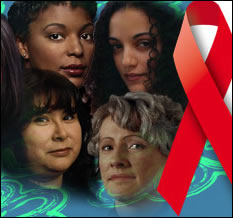 Impaired
sexual function is common among people with chronic diseases;
physical disability, psychological distress, and medication side
effects can all play a role. While there has been some study of
sexual function among HIV positive men, there is less information
about this condition in HIV positive
women.
Impaired
sexual function is common among people with chronic diseases;
physical disability, psychological distress, and medication side
effects can all play a role. While there has been some study of
sexual function among HIV positive men, there is less information
about this condition in HIV positive
women.
Tracey Wilson from the State University of New York Downstate
Medical Center and colleagues conducted a study to compare impaired
sexual function among women with and without HIV, and to describe
clinical and psychosocial factors associated with these problems.
They looked at aspects of sexual function including sexual desire,
physiological arousal, difficult or painful intercourse, ability
to achieve orgasm, and satisfaction with sex.
The analysis included more than 1800 participants in the Women's
Interagency HIV Study (WIHS), an ongoing observational study of
HIV positive and at-risk HIV negative women in the U.S.
Between October 2006 and March 2007, a total of 1279 HIV positive
women and 526 HIV negative women completed a study visit that
included administration of the Female
Sexual Function Index (FSFI), physical and gynecological examinations,
and blood sample collection.
Results
 |
HIV
positive women reported more sexual problems than HIV negative
women. |
 |
The
average FSFI score among HIV positive women was significantly
lower than that of the HIV negative group (13.8 vs 18.0, respectively,
on a scale of 0-36). |
 |
Other
factors that independently predicted poorer sexual function
included: |
| |
 |
Being
menopausal; |
 |
Having
symptoms of depression; |
 |
Not
being in a relationship with a spouse or regular partner.
|
|
 |
CD4
cell count was independently associated with FSFI scores. |
 |
Women
with CD4 counts of 199 cells/mm3 or lower reported significantly
poorer sexual functioning than those with 200 cells/mm3 or
higher. |
 |
About
one-third of HIV positive women and about one-quarter of HIV
negative women reported not having vaginal, anal, or oral
sex since their last WIHS study visit (conducted every 6 months). |
 |
Women
who reported better sexual function had a higher average number
of sexual partners. |
Based
on these findings, the researchers concluded that the study "shows
a clear link between HIV infection and sexual problems among women."
"Given research documenting relationships between self-reported
sexual problems and both clinical diagnoses of sexual dysfunction
and women's quality of life, greater attention to this issue as
a potential component of women's overall HIV care is warranted,"
they wrote.
Departments of Community Health Sciences, Medicine, and Neurology,
State University of New York, Downstate Medical Center, Brooklyn,
NY; Department of Epidemiology, Johns Hopkins Bloomberg School
of Public Health, Baltimore, MD; Department of Medicine, Stroger
Hospital and Rush University, Chicago, IL; Departments of Psychiatry
and Psychology, Obstetrics and Gynecology, and Medicine-Geriatrics,
University of Illinois at Chicago, Chicago, IL; Departments of
Clinical Pharmacy, Medicine and Epidemiology, and Biostatistics,
University of California, San Francisco, CA; Division of Gynecologic
Oncology, Washington University School of Medicine, St. Louis,
MO; Department of Medicine, Montefiore Medical Center, Bronx,
NY; Department of Medicine, Georgetown University, Washington,
DC.
4/6/10
Reference
TE
Wilson, G Jean-Louis, R Schwartz, and others. HIV Infection and
Women's Sexual Functioning. Journal of Acquired Immune Deficiency
Syndromes (Abstract).
February 20, 2010 (Epub ahead of print).
